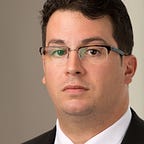What Needs to Change About American Policing?
Police are charged with enforcing too many laws and solving too many social problems.
In late July, I had the distinct honor to join several prominent voices in the policing space for a virtual roundtable discussion about the future of policing, reforms, and broader themes in American criminal justice. The roundtable was hosted by Democracy: A Journal of Ideas and it was moderated by their editor-in-chief, Michael Tomasky. The transcript of the discussion will be in the forthcoming Fall issue of the magazine and it went live online this morning.
My co-panelists were Dr. Phillip Atiba Goff, CEO of the Center for Policing Equity, Lt. Diane Goldstein (ret.), Chair of Law Enforcement Action Partnership, and Prof. Seth Stoughton of the University of South Carolina School of Law and a former law enforcement officer and investigator. The discussion was wide-ranging and provided nuance to the terms and ideas that have come to dominate the news cycles about the nationwide protests.
We all agreed that the status quo of policing is unsustainable, and our differences largely appeared in our individual emphases on aspects of law enforcement and American politics that need to change. Also, I think we all recognized that much of the problem with policing in the United States comes from broader failures to rectify the socio-economic problems that have always been with us, and the government has relied far too heavily on the criminal justice apparatus to fix them. As I said that day:
As both policy reformers and citizens, we have to disincentivize officers from enforcing laws for the sake of enforcing them.
But more broadly, it’s difficult to communicate to the general public how the police are providing so many services that we don’t want them to do and that they don’t want to be doing. We have all these problem-solving courts, whether they’re drug courts, veterans’ courts, mental health courts, all to address failures to fix these enduring problems within society. And instead of simply addressing those problems, we’re putting an armed person and the threat of a cage in between a person in need and the help that we all know that they need. And that doesn’t make any sense.
Each panelist brought their own perspectives that anyone who is interested in this topic should read, even if they disagree. Although one can never remove all politics from public policy arguments, there was no partisanship or cheap point-scoring that is so common on television commentary. Every person on this panel has dedicated their professional life to explaining how police and criminal justice systems work and how to make them better/mitigate the harm they cause. It was a pleasure to be a part of and I hope people learn a lot from it.
You can read the whole thing at the Democracy website here.
